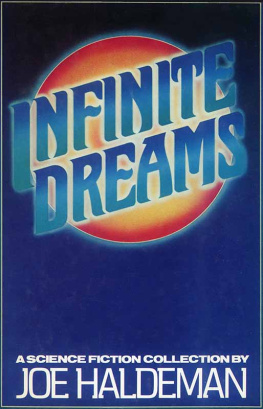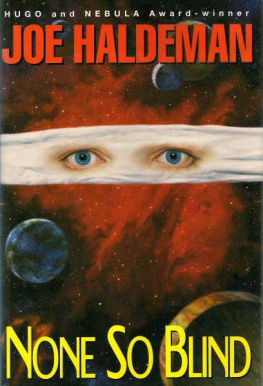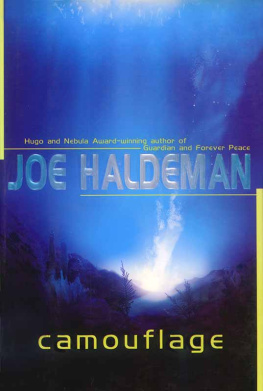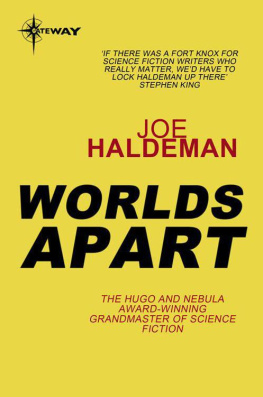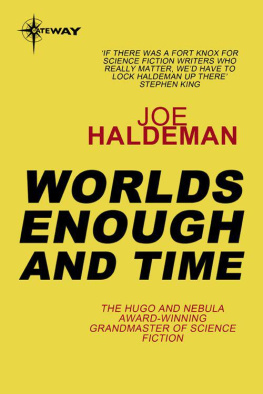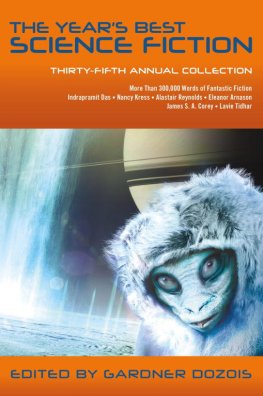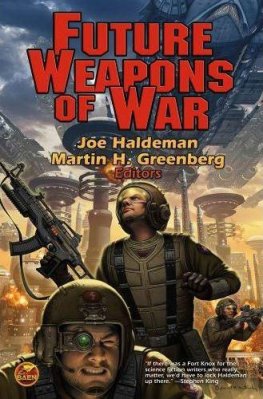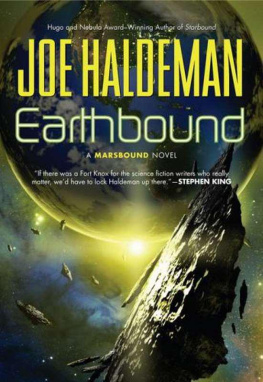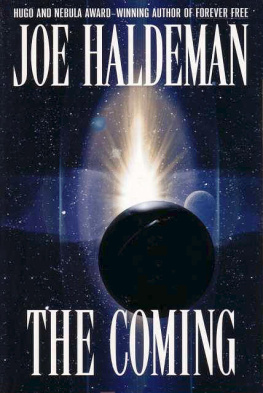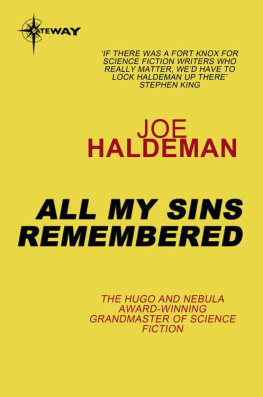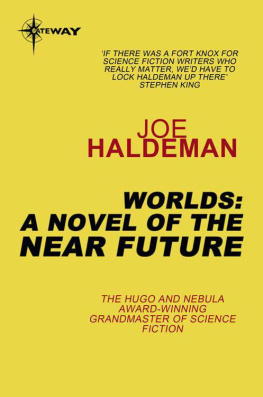Joe Haldeman - Infinite Dreams: A Science Fiction Collection
Here you can read online Joe Haldeman - Infinite Dreams: A Science Fiction Collection full text of the book (entire story) in english for free. Download pdf and epub, get meaning, cover and reviews about this ebook. year: 1978, genre: Detective and thriller. Description of the work, (preface) as well as reviews are available. Best literature library LitArk.com created for fans of good reading and offers a wide selection of genres:
Romance novel
Science fiction
Adventure
Detective
Science
History
Home and family
Prose
Art
Politics
Computer
Non-fiction
Religion
Business
Children
Humor
Choose a favorite category and find really read worthwhile books. Enjoy immersion in the world of imagination, feel the emotions of the characters or learn something new for yourself, make an fascinating discovery.
- Book:Infinite Dreams: A Science Fiction Collection
- Author:
- Genre:
- Year:1978
- Rating:4 / 5
- Favourites:Add to favourites
- Your mark:
- 80
- 1
- 2
- 3
- 4
- 5
Infinite Dreams: A Science Fiction Collection: summary, description and annotation
We offer to read an annotation, description, summary or preface (depends on what the author of the book "Infinite Dreams: A Science Fiction Collection" wrote himself). If you haven't found the necessary information about the book — write in the comments, we will try to find it.
Infinite Dreams: A Science Fiction Collection — read online for free the complete book (whole text) full work
Below is the text of the book, divided by pages. System saving the place of the last page read, allows you to conveniently read the book "Infinite Dreams: A Science Fiction Collection" online for free, without having to search again every time where you left off. Put a bookmark, and you can go to the page where you finished reading at any time.
Font size:
Interval:
Bookmark:
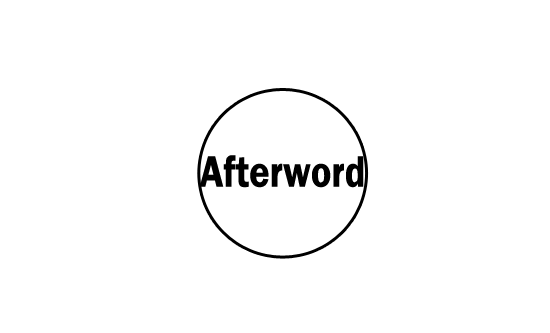
Where do you get your crazy ideas? Well, if we tabulate the assertions made in the introductions to these stories, it goes like this: Magazine articles, two. Editorial suggestions, four. Cover painting, one. Works of other writers, two. The weather, two. Personal joke, one. Stylistic experiments, two. Personal emotional experience, two. Out of nowhere, two.
Actually, I think all of them came out of nowhere.
R. A. Lafferty, than whom there is no more original writer in science fiction, claims that theres no such thing as an original idea, and writers who think they sit down and go through some rational process to arrive at a story are kidding themselves. He claims that all ideas float around as a kind of psychic public property, and every now and then one settles on you. That sounds dangerously mystical to mesubversivebut I think its true.
So how can you square that with obeying the editor who calls in the middle of the night and asks for a four-thousand-word story about the person who ate the first artichoke? Easily.
When a writer sits down to start a story he faces a literal infinity of possibilities. Being told to write about a specific thing, or to a given length, doesnt really diminish the number of possible stories. The effect is the same as dividing infinity by a large but finite number: you still have infinity. Obviously, a writer who figures out his own story idea and then proceeds to write it is duplicating this not-really-restrictive process. Writing what he wants to write about may allow him to write a better storyor it may not, if his infatuation with the idea interferes with his objectivitybut I think any really good writer can take any editorial requirement, so long as its not patently stupid or offensive, and wind up writing a story he would have written anyhow.
Ideas are cheap, even crazy ones. Every writer has had the experience of a friend or relativeor stranger!saying, Ive got this great idea for a story you write it and Ill split the money with you fifty-fifty. The proper response to this depends on the generous persons occupation. In the case of a prizefighter, for instance, you might offer to name a few potential opponents, and only demand half the purse. An editor, of course, you humor. They rarely ask for as much as half.
All of this is not to say that there arent days when you sit down at the typewriter and find that your imagination has frozen solid; you cant come up with anything to write, no ideas come floating down out of Laffertys ether. When this happens in the middle of a novel, its a scary thing. But if youre just facing a short story that wont get itself started, theres an easy way to cope with it, a trade secret that Gordon R. Dickson passed on to me, saying it hadnt failed him in twenty years:
Start typing. Type your name over and over. Type lists of animals, flowers, baseball players, Greek Methodists. Type out what youre going to say to that damned insolent repairman. Sooner or later, perhaps out of boredom, perhaps out of a desire to stop this silly exercise, youll find youve started a story. Its never taken me so much as a page of nonsense, and the stories started this way arent any worse than the one about the artichoke.
One restriction most good science fiction writers accept without question is that the scientific content of their stories be as accurate as possible. Is this really necessary? Yes, but not for the obvious didactic reason. We are not obligated (or qualified, in most cases) to teach science to anybody.
A person who thinks he learns science from science fiction is like one who thinks he learns history from historical novels, and he deserves what he gets. Some few science fiction writers, like Gregory Benford and Philip Latham, are working scientists, and a good fraction of the rest of us have degrees in some science. That doesnt make us qualified to write with authority on subjects outside of our areas of studybut we do it; youd have a short career if all of your stories were about magnetohyrodynamics or galactic morphology. So we try to be intelligent laymen in other fields, staying current enough so that our inevitable errors wont be obvious to other laymen.
Any fiction writer is in the business of maintaining illusion. Like a stage magician, his authority lasts only until he makes his first error. Every writer has to deal with mechanical consistencies like making sure the woman named Marie in chapter one doesnt turn into Mary in chapter four. He also has to be careful about routine details, not letting the sun set in the east (as John Wayne made it do in The Green Berets), and so forth. If he writes in a genre, he has an added burden of detail, since most of his readers consider themselves experts. Mundane esoterica: Spies call the CIA the Company, not the Agency. A private eye doesnt have to break into a car and read the registration card to find out who owns it; he jots down the license number and sends a form to the Department of Motor Vehicles. A cowboy normally carried only five shots in his six-shooter; only a fool would leave the hammer down on a live round.
One reason science fiction is harder to write than other forms of genre fiction is that this universe of detail is larger, more difficult of access, and constantly changing. I wonder how many novels-in-progress got thrown across the room in 1965, when scientists found that Mercury didnt keep one face always to the Sun, after all. I wonder how many bad ones got finished anyhow.
Nobody can be an expert on everything from ablation physics to zymurgy, so you have to work from a principle of exclusion: know the limits of your knowledge and never expose your ignorance by attempting to write with authority when you dont really know whats going on. This advice is easier to give than to take. Ive been caught in basic mistakes in genetics, laser technology, and even metric nomenclaturein the first printing of The Forever War I referred time and again to a unit of power called the bevawatt. What I meant was gigawatt; the only thing bev means is billion-electron-volt, a unit of energy, not power. I got letters. Boy, did I get letters.
The letters are humbling, and time-consuming if you feel obligated to answer them (I do, so long as they arent abusive or idiotic). But the possibility of being caught in error isnt the main reason for taking pains.
When I finish writing a science fiction novel I have a notebook or two of technical notes, equations, diagrams, graphs. Even a short story, if its a hard-core-science one like Tricentennial, might generate a dozen pages of notes. Not one percent of this stuff finds its way into the story. It may even be naive science and weak mathematicsbut it will have served its purpose if it has made a fictional world solid and real to me.
Because this business of illusion works both ways. For a story to succeed, the writer must himself be convinced that the background and situation the story is built on make sense. Ernest Hemingway pointed out (though I think Gertrude Stein said it first) that the prose of a story should move with the steady grace of an iceberg, and for the same reason an iceberg does: seven-eighths of it is beneath the surface. The author must know much more than the reader sees. And he must believe, at least for the duration.
Which brings us back to Mr. Lafferty. What Im really doing with all these equations and graphs, I think, is putting myself into a properly receptive frame of mind. Other writers draft endless outlines to the same purpose, or sharpen pencils down to useless stubs, or take meditative walks, or drink bourbon. And through some mysticalor subconscious, or subrationalprocess, where there was white paper theres a sentence, a page, a story. Finding the proper words is not at all a mystical process, just creative labor. The ideas that serve as scaffolding for the words, thoughthey come from out of nowhere, and serve you, then return.
Font size:
Interval:
Bookmark:
Similar books «Infinite Dreams: A Science Fiction Collection»
Look at similar books to Infinite Dreams: A Science Fiction Collection. We have selected literature similar in name and meaning in the hope of providing readers with more options to find new, interesting, not yet read works.
Discussion, reviews of the book Infinite Dreams: A Science Fiction Collection and just readers' own opinions. Leave your comments, write what you think about the work, its meaning or the main characters. Specify what exactly you liked and what you didn't like, and why you think so.

